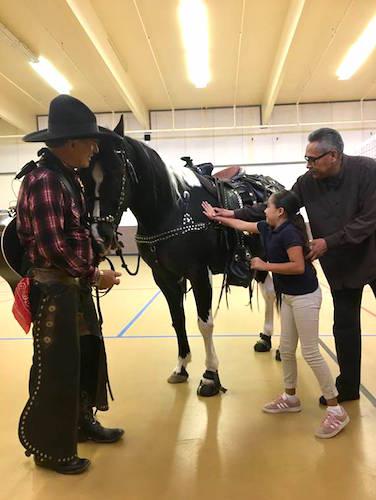Grant Spotlight on the Cowboy Poetry Education Program at the Desert Caballeros Western Museum

It’s no secret that the U.S. has a rich history and culture of cowboys and ranchers. But while we may be familiar with the image of the cowboy from country songs and movie westerns, there is also a strong tradition of capturing ranching life in literature, particularly the genre of poetry known as cowboy poetry. With Challenge America grant support from the National Endowment for the Arts, the Desert Caballeros Western Museum in Wickenburg, Arizona and the Wickenburg Chamber of Commerce partnered with local schools to create an education program for students to learn first-hand about what cowboy poetry is and why it’s important.
"We have a lot of ranching families,” said Natalie Olson, director of the cowboy poetry education program at the museum. “We just wanted to show the importance of this art form to people to get back to the roots of what the town was in the 1800s and 1900s."
Each year the Chamber of Commerce hosts the Cowboy Christmas Poetry Gathering, where cowboy poets from all over the United States come together to perform and share their work. Since the early 2000s, the gathering--which just celebrated its 30th anniversary—has included a contest to encourage students to write their own cowboy poems.
At the beginning of the school year, the museum, which is dedicated to preserving the cultural history of the American West, reaches out to various schools in the region to set up field trips, class visits, and even assemblies so that they can present this contest to the students. For these presentations, the museum brings in a cowboy culture presenter, who could be a cowboy poet, rancher, or even both, as a guest speaker on Western heritage and cowboy culture.
The museum takes great care to select speakers who will get the kids excited to participate in the program. For example, thanks to their NEA funding, they were recently able to feature Gary Sprague, a cowboy singer who sings from the saddle of his horse, while doing tricks to entertain the children.
"It’s a lot more exciting when you have a professional singer and songwriter on top of a horse in the gymnasium," said Olson. "That gets the kids that more enthusiastic and excited about the program and wanting to participate."
After the presentations are over, the students are encouraged to write and submit their own poems. The best five poems from each class are forwarded to a panel of professional cowboy poets and ranchers from the Wickenburg community who select first, second, and third place winners along with up to five honorable mentions in elementary school, middle school, and high school categories. In total, the program serves roughly 1,000 students in 13 different schools from five different school districts in three different counties, spanning over 3,000 square miles.
The winners receive cash prizes and recognition in the local newspaper. In addition, the winners and honorable mentions are invited to recite their poems at the Cowboy Christmas Poetry Gathering. The grand prize winner is also invited to recite their poem during a special reception at the gathering.
"One of the program objectives is to promote public speaking with these kids," said Olson. "A lot of them have never done it or are terrified of it, so we get them on stage. We want to promote their creativity, their writing skills, their public speaking, and also just give them an environment to participate in a community activity."
In addition to developing those skills, the museum aims to explain to the students the importance of their Western heritage and what it means to the Wickenburg community. They teach them about the history of their town, with its origin of mining and ranching, and the importance of spoken word. They want to improve the students’ speaking abilities and encourage them to experience the culture that Wickenburg and Arizona have to offer.
"You’d be surprised by how many kids live in this town … that have never been on a horse or hiked outside," said Olson. "They go from school to home and play video games. They’re not outside enjoying the desert. This reminds them of where they live and where they come from."




